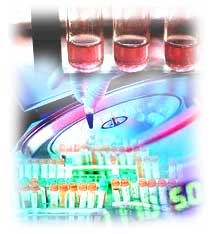A series of special blood tests can often determine whether or not the liver is functioning properly. These tests may also distinguish between acute and chronic liver disorders and between hepatitis and cholestasis (bile obstruction). The most commonly performed blood tests include: Serum Bilirubin - Elevated levels of bilirubin often indicate an obstruction of bile flow or a defect in the processing of bile by the liver. Bilirubin is produced by the liver and is excreted in the bile. Serum Albumin - Below-normal levels of albumin, a protein made by the liver, are associated with many chronic liver disorders and cirrhosis. |  |
Gamma-glutamyl Transpeptidase (GGT) - This enzyme is released into the blood when the liver is damaged especially by alcohol or in bile obstruction.
Alpha-fetoprotein (AFP) - This protein is produced by the fetal liver and testes, indicating hepatitis or cancer.
Mitochondrial Antibodies (AMA) - The presence of these antibodies can indicate primary biliary cirrhosis, chronic active hepatitis, and certain other autoimmune disorders.
Virus tests
- HAV IgM, HEV IgM - these detect active infection by Hepatitis A or E virus
- HCV-Ab - this detects evidence of infection by HCV virus
- HCVRNA - this detects the actual presence of HCV virus
- HBsAg, HBeAg, HBV DNA - these detect infection with Hepatitis B virus (HBV)
- Anti-HBs - the evidence of good immunity to HBV infection








No comments:
Post a Comment